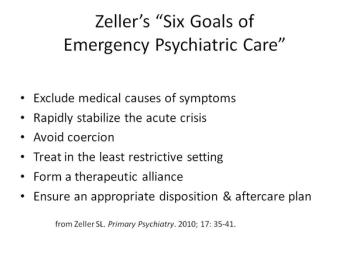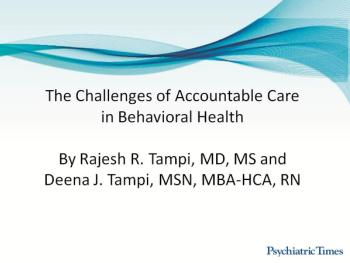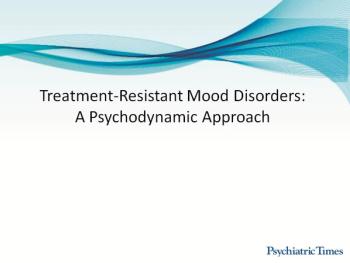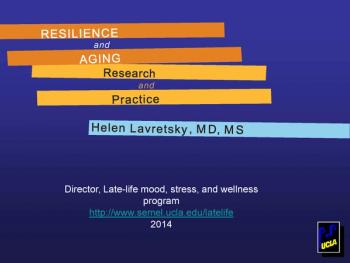
Is bipolar disorder overdiagnosed? Underdiagnosed? Neither? In this podcast, Dr S. Nassir Ghaemi offers his perspective on those questions.

Is bipolar disorder overdiagnosed? Underdiagnosed? Neither? In this podcast, Dr S. Nassir Ghaemi offers his perspective on those questions.

The removal of the so-called “bereavement exclusion” (BE) from DSM-5 was one of the most difficult and controversial decisions the DSM-5 work groups made, and many clinicians continue to find the distinction between ordinary grief and major depression confusing.

There has been a lot of publicity about hearing loss as a predisposing factor to depression and dementia. What about visual problems? These questions and more in this expert Q&A.

Agitation is a spectrum of symptoms . . . it can go all the way from being irritable up to pacing to lashing out to clenched fists to outright violence. Intervention via de-escalation techniques at an early stage is optimal. More in this podcast.

It seems ironic that the Oedipus myth about self-inflicted blindness is so central to psychiatry, but there are few guidelines on treating sensory loss. Here, the evolution of an APA workshop on treating patients with visual impairments.

What are the psychological and physiological effects of persistent loneliness? How prevalent in the US? What role can cognitive behavioral therapy play for persistently lonely people? In this podcast, an expert offers a brief overview of this underappreciated, but often overlooked, problem.

Presenting a Q&A with Dr Rajesh Tampi and Deena Tampi on the issue of behavioral health in accountable care.

Running into an old friend at the American Psychiatric Association Annual Meeting: Use hashtag #APAAM14.

Recognition, management, and understanding of the broad range of sexual feelings in older adults is a key component to providing humane and competent care. More in this expert Q&A.

In this podcast, Dr Eric Plakun give an overview of key points and psychodynamic principles on treatment-resistent mood disorders, based on research and clinical experience.

What differentiates this film from other Holocaust documentaries is that it documents the bonds between 4 Israeli-born siblings, recently bereaved, as much as it documents details about the fate of their father at the hands of Hitler’s henchmen.

A video featuring the author of the DSM-5 Handbook, Dr Michael First describes differential diagnosis and assessment, central components of clinical practice.

What happens when our patients get pregnant or plan to get pregnant? What if psychiatric illness manifests during pregnancy or the perinatal period? Dr Elizabeth Fitelson answers these questions and more in this video.

An expert talks briefly about interventions that can help bolster resilience and help older people recover quickly from adversity.

There’s a lot going on at the American Psychiatric Association Annual Meeting in the Big Apple this year . . . so much, in fact, that we’ve invited the Chair of Scientific Program Committee, Dr Philip R. Muskin, to provide you with a road map. More in this podcast.

While the growing evidence base for the positive effects of lithium on brain health is compelling, the evidence remains preliminary.

Surprisingly, psychiatrists and psychiatric nurses “were just as likely” as their primary care counterparts to display negative biases toward individuals with schizophrenia seeking general medical care.

At the recent annual APA meeting, Dr Abraham Halpern was posthumously honored for the second annual Humanitarian Award by the American Association for Social Psychiatry. He was honored for his contributions to ethics, forensics, and advocacy of social issues.


The human brain needs to be nourished. To function properly, it requires omega-3 fatty acids, folate, fiber, choline, iron, zinc, and vitamins B12, D, and E among other nutrients.

A panel of experts at the APA Annual Meeting discussed how changes in DSM-5 may affect clinical practice. Highlights here.

A clinician’s notes and clinical records should document and defend treatment decisions, and are the best defense in court. Here: 3 key things every patient record should include.

Our brains can be trained to function better as we age, and it doesn't take the Fountain of Youth to get there. In this podcast, geriatric psychiatrist Helen Lavretsky prescribes strategies to challenge our brains. She notes: "The more we challenge our brain, the more new nerve pathways and circuits we form."

The presence of a psychiatric diagnosis does not necessarily indicate lack of decisional capacity.

You are invited to spend the next few minutes listening to what Dr Steven Moffic has to say about how the environment may be affecting your patients and what impact ecologically-related syndromes might have on psychiatry.

Thinking about suicidal behavior as a diagnosable problem will help bridge the gap in how psychiatrists think about suicidality and how it is perceived by patients and their families.

Certain aspects of depression result from maladaptive stress-induced changes in reward circuits of the brain.

Two problems persist in the treatment of severe mental illness that constitute a barrier to effective patient-centered care: excessive reliance on a limited number of antipsychotic medications at the expense of other effective treatments, and the underutilization of other evidence-based treatment options.

Data from neurobehavioral studies, brain imaging studies, epidemiological surveys, and clinical trials show that pathological gambling shares aspects of both impulsivity and compulsivity.

A study of veterans at risk for suicide showed that single attempters did not differ from multiple attempters on any variable except a history of childhood physical abuse.